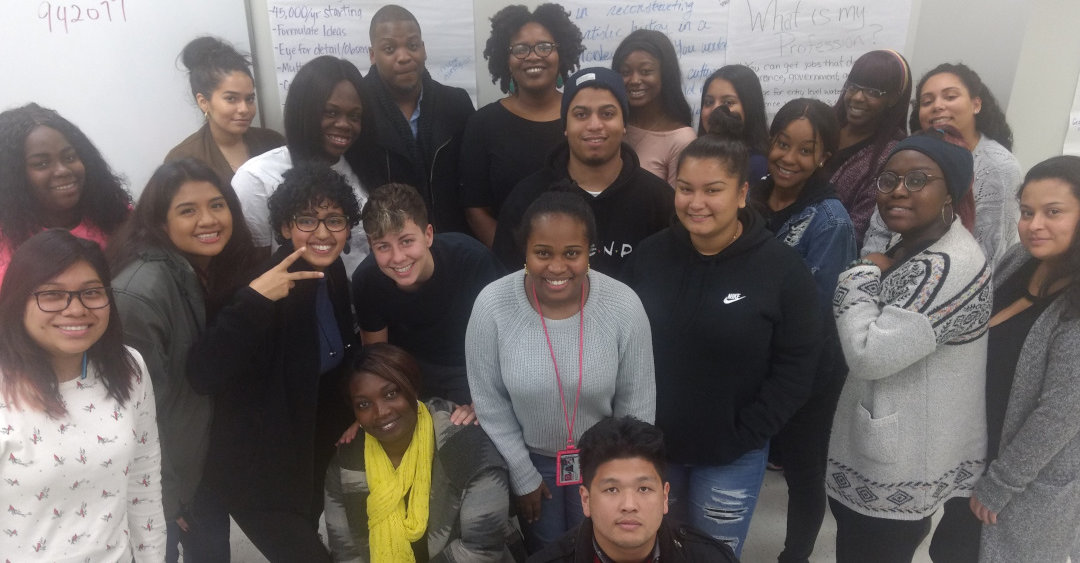Since 2014, I have taught at the community college and public and private four-year institutions through a pedagogical engagement of what I call social text —critical investigation at the axis of social justice. Social text is the integration of a variety of knowledge generating platforms, from visual arts to literature, to engage scholarly discourse. Our information age and divergent viewpoints of social issues has informed my producing a classroom that a) provides a platform for knowledge-building; b) provides independent research exploration; and c) elevates students’ innate knowledge. For example, students completed a Class Mixtape assignment in which they submitted songs by various artists, such as Tupac Shakur and Billie Holiday, which were congruent with cultural and ethnic studies discourse of the Black experience in urban environments.
Throughout Urban Black Psychology, we relied heavily on written text and storytelling by reading academic text alongside documentaries and guest speakers analysis of social issues. We also visited the African Burial Ground. For a list of all the written materials see our bibliography.
Bibliography
Andersson, J. (2015). ‘Wilding’ in the West Village: Queer Space, Racism and Jane Jacobs
Hagiography. International Journal of Urban and Regional Research, 39(2), 265-283.Camp, J. T. (2012). Blues Geographies and the Security Turn: Interpreting the Housing Crisis in
Los Angeles. American Quarterly, 64(3), 543-570.
Chang, J. (2007). Can’t stop won’t stop: A history of the hip-hop generation. St. Martin’s Press.
Critical Resistance. (2008). Abolition now! Ten years of strategy and struggle against the prison
Industrial complex.
Du Bois, W. E. B. (2008). The souls of black folk. Oxford University Press.
Du Bois, W. E. B., & Eaton, I. (1899). The Philadelphia Negro: a social study (No. 14). Published for the University.
Fanon, F. (1952). The fact of blackness. Postcolonial Studies: An Anthology, 15-32.
Johnson, G. T. (2013). Spaces of conflict, sounds of solidarity: Music, race, and spatial
Entitlement in Los Angeles (Vol. 36). Univ of California Press.
Kelley, R. D. G. (2001). Yo’mama’s disfunktional!: Fighting the culture wars in urban America.
Beacon Press.
Kelley, R.D.G. (2016). “Births of a Nation: Surveying Trumpland with Cedric Robinson” in
Race, Capitalism Justice in Boston Review: Forum 1.
Kelley, R.D.G. (2016). “What did Cedric Robinson mean by Racial Capitalism” in Race,
Capitalism Justice in Boston Review: Forum 1.
Meeks, D. (2006). Police militarization in urban areas: The obscure war against the underclass.
The Black Scholar, 35(4), 33-41.
McKittrick, K., & Woods, C. A. (Eds.). (2007). geographies and the politics of place (pp. 1-13).
Toronto: Between the Lines.
McKittrick, K. (2013). Plantation futures. Small Axe, 17(3 42), 1-15.
Melamed, J. (2015). Racial capitalism. Critical Ethnic Studies, 1(1), 76-85.
Williams, R. Y. (2004). The politics of public housing: Black women’s struggles against urban
Inequality. Oxford University Press.
Wilson, B. M. (2000). America’s Johannesburg: Industrialization and racial transformation in
Birmingham. Rowman & Littlefield.
Woods, C. A. (2005). Do You know what it means to miss New Orleans?: Katrina, trap
Economics, and the rebirth of the blues. American Quarterly, 57(4), 1005-1018.
Wright, R. (1937). The ethics of living Jim Crow: An autobiographical sketch (pp. 225-37).
